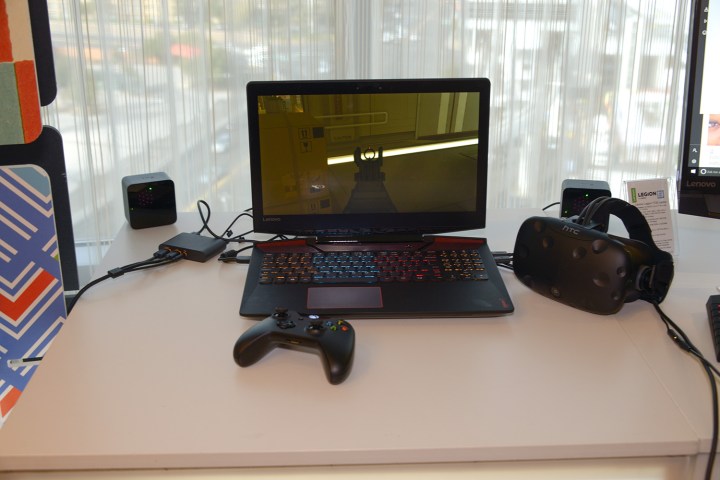After years of dipping its toe in the “gaming” market, Lenovo has officially entered the ring by launching a dedicated gaming line, Legion, and its VR-focused notebook, the Legion Y720. The more powerful of the two Legion laptops, the Y720 comes with a bevy of interesting feature ideas that make a strong case for Legion as a new and novel PC gaming brand, including proprietary software for consuming 2D content — interactive or otherwise — in VR. However, with the device launching in a just few months, some of these features felt unrefined. As a result, the Y720 could be the perfect gaming laptop for VR-heads, if it can do everything its supposed to.
The Y720 sports a Kaby Lake i5 or i7 Core processor, an Nvidia GeForce 1060 GPU, 16GB of RAM, and either 512GB SSD or a 2TB SATA HDD. It has a 15.6” inch IPS display, supporting a 1,920 x 1,080 or 3,840 x 2,160 resolution.
The built-in Xbox One receiver is a surprisingly important quality-of-life improvement.
As with many high-end
For players who prefer a gamepad, the Y720 includes an internal receiver for the Xbox One controller, allowing you to pair up to four controllers to the laptop without a cord or dongle. Though it’s a small luxury, as someone who swaps controllers between consoles and computers, I can assure you it’s a surprisingly important quality-of-life improvement.
A VR laptop, with a unique twist
Lenovo has positioned the Y720 as a VR headset-owner’s machine, and has proprietary VR screen software to consume non-VR content on a Vive, Rift, or, in time, Lenovo’s own upcoming Windows holographic headset.
Using the Lenovo Entertainment hub, an internal media library that gives your personal media collection a more polished look and feel, watching a movie in your headset puts you in a VR simulation of a movie theater. Like at a real theater, the screen takes up most of your field of view, but you can see the edges of the screen. If you turn your head you’ll see an empty theater, complete with seats, fabric walls, and blinking lights over the emergency exit doors.
The most interesting of these features is what Lenovo calls “VR upscaling,” which transposes the screen of a PC game into the full view of the headset. Similar to the non-VR gameplay on PlayStation VR, games output at a lower resolution, but take up your entire field of view. You can also use your headset’s head-tracking to control a cursor or, as we saw in Deus Ex: Mankind Divided, a gun’s reticle.
VR upscaling transposes the screen of a PC game into the full view of a VR headset.
The “upscaled” game looked good and ran smoothly on the Vive. Mankind Divided lacked the distinctive glossy shimmer you’d see on the laptop display, but still looked sharp overall. The head-tracking was similarly quick and responsive. I wouldn’t necessarily advise you use it for precision gameplay, but under the right circumstances it could be a lot of fun.
However, not everything worked as it should have. Mankind Divided did not work properly on an Xbox One controller alone: Certain features, such as toggling the head-tracking on and off, were mapped to buttons on the gamepad. Similarly, some game menus were non-responsive. While configurable controls, almost certainly a given, will solve the problem, it does seem Lenovo has some more working to do before VR Upscaling is bug-free.
Lenovo was unclear as to whether these features would be limited to the specific games that choose to support these features, or if they would be universally applicable. While replicating your display in the headset may work well in many cases, some of its other features may vary. If it can stabilize, streamline, and, in some cases, realize, all of the features it claims to offer, the Legion Y720 is poised to be a contender for anyone considering a high-end gaming laptop this year.
The Lenovo Legion Y720 will be available in April, 2017, starting at $1,399 for the baseline model.
Highs
- Knows what it wants to be, a VR gamer’s machine
- Optional Xbox One receiver is great for players for who prefer gamepads
- “VR upscaling” for playing non-VR games on a headset
- Beautiful display
Lows
- VR upscaling still had a few bugs
- Relies heavily on Lenovo software
Editors' Recommendations
- Lenovo just made my favorite gaming laptop even better
- With Lenovo’s Legion Go, do we finally have a Steam Deck killer?
- Lenovo’s new 14-inch gaming laptop beats the ROG G14 in one key way
- Lenovo unleashes an avalanche of monitors, including a 4K 144Hz beast
- Lenovo Legion Slim 7i hands-on review: Portable powerhouse






